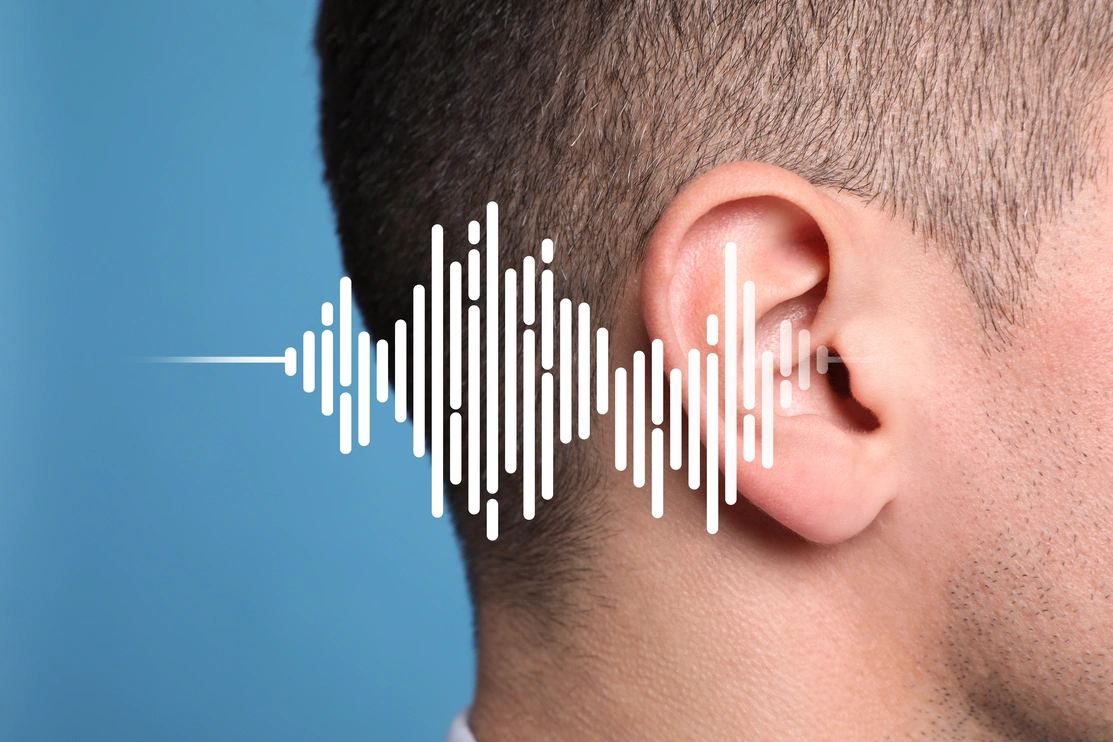Tinnitus
Tinnitus is an awareness of sound in the ears or head which is not from an external source.
Tinnitus is an awareness of sound in the ears or head which is not from an external source.

There are many different types of tinnitus noise and sounds. Common descriptions are that it is a hiss, whistle, whirring or buzz. Occasionally, it can be segments of music. The pitch can be high or low and the level can vary over time.
In its mildest form, tinnitus is extremely common, and many people experience occasional sounds in their ears, for example after being in a noisy place such as a concert.
Around 1 in 7 people in the UK are affected by tinnitus – that 7.6 million people. Of that number, 1.5 million live with severe tinnitus. (Source: Tinnitus UK)
There are two main types: subjective and objective tinnitus:
The exact cause of tinnitus is unknown, but it not regarded as a disease or illness. It is a change to the transmission of the signal going from the ear to the part of the brain where sound is processed, known as the auditory cortex.
This means that some parts of the auditory cortex do not receive signals as they used to. In some people, this area reacts by developing spontaneous ‘chatter’, which becomes synchronised to create the illusion of sound.

Over time, this firing pattern is strengthened, and the tinnitus can become a constant sound. The following factors are known to be involved in the development of tinnitus:
Tinnitus is more common in people who have some degree of hearing loss. It is estimated that 80% of people with severe-profound hearing loss experience tinnitus. (Source: Tinnitus UK)
Noise is one of the most common causes of hearing loss. A single incident experienced at close range may permanently damage your hearing in an instant. Repeated exposures to loud noise over an extended period present serious risks to human hearing.
For more than one in ten suffering chronic tinnitus the problem stems from a neck or head injury.
Any ear infection can cause blockage of hearing and so make the occurrence of tinnitus more likely.
There are several diseases of the ear that can occur in an otherwise healthy person, all of which can cause hearing loss and so make the occurrence of tinnitus more likely.
Certain medications, both prescription and over the counter, can cause tinnitus. Tinnitus is cited as a potential side effect for about 200 prescription and non-prescription drugs.
How you manage your tinnitus may have a connection with the level of stress you are under. If you have a high level of stress, there is a greater chance that you will be troubled by your tinnitus.
National charity Tinnitus UK offers free help and support for people living with tinnitus. Get support via its free helpline, chat function, text and email.
The first part of managing tinnitus is not to panic. First, consult a GP, who will refer suspected cases to an Ear, Nose and Throat (ENT) doctor, or audiologist that specialises in tinnitus.

Relax, relax and relax some more: “My tinnitus gets worse with stress or illness, so it is very important to take time to rest and de-stress.”
Exercise: “It’s a great way to de-stress. I recommend Tai Chi in particular, because it helps you focus on the movements you make, your breathing and body space. With a little practice, I find it is possible to zone out the ringing in my ears.”
Get busy with something else: “Transfer your mind to a project or activity that requires you to think about something else. Stop allowing the tinnitus to control your every thought. Concentrate outside of the noise instead.”
Avoid loud music: “Wear ear plugs if you go to loud venues or concerts. Protect your ears at all times!”
Embrace white noise: "Listen to something soothing, such as ‘white noise’ to help you to balance the tinnitus and therefore change how it sounds to something much more acceptable.”
Go with the flow: “Sometimes I hear choral music, which I try to relax and enjoy. I visualise a peaceful place and give it time to disappear.”
There are various bodies conducting research into tinnitus. Here is the work undertaken by our colleagues in the sector:

Hearing loss is common symptom of ear infections. In most cases, it is likely to be temporary and go away after treatment. This page looks at causes and how to avoid future infections.

Common types of balance disorder include Meniere's Disease and Labyrinthitis.
Registered charity in England and Wales no. 293358 and in Scotland no. SC040486. Royal Patron HRH The Princess Royal.